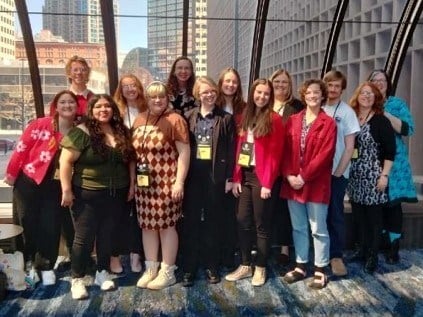
USU’s English Department was well-represented at the annual Sigma Tau Delta Convention in Denver, Colorado, from March 29-April 1 with 12 undergraduate participants from four different campuses. The Sigma Tau Delta Convention is the largest organization in the country dedicated to supporting undergraduate research and professional development for English majors. About 1,000 students attend from all over the country. In addition to workshops about leadership, editing, publishing, and teaching, students present their creative and critical projects and hear from major authors. Dakota Mecham, from the Vernal campus, says of her experience, “I had so much fun at convention and learned so much! From breakout sessions on Frankenstein to heartfelt discussions on how we can change what our future looks like, it was a full four days. I met students from around the country to talk about the future of English and the Humanities. It re-energized me for school and gave me inspiration to continue on in my degree.”
This year’s featured writer was Brenda Peynado, who authored the short story collection, The Rock Eaters, which explored themes of immigration, belonging, gender, identity, class, and political action. Two groups of USU students focused their research on Peynado’s book. Vanessa Garcia-Vazquez, Amanda Gromanchy, Ericka Stone, Basil Payne, and Ashleigh Lyon presented their roundtable discussion, “Insiders and Outsiders in The Rock Eaters,” with Professor Christine Cooper-Rompato acting as faculty moderator. Jenny Carpenter, Dakota Mecham, Aimee Olson, Beth Pace, and Preston Waddoups presented their roundtable discussion, “Sticks and Stones: Politics in The Rock Eaters,” with Associate Professor Michaelann Nelson acting as faculty moderator. Jimmy Shupe, from the Brigham City campus, presented his essay, “Jane Austen and Feminism,” which originated in Professor Alan Blackstock’s class and argues that Jane Austen’s work, especially Persuasion, portrays proto-feminist ideals. Preston Waddoups, from the Logan campus, presented his essay, “The Aesthetic Philosophy of Anna Karenina,” which also originated in Alan’s class and argues that the novel conveys Tolstoy’s very specific ideas about the aesthetic function of art in society.
Ericka Stone, from the Logan campus, presented her essay, “Value in Cabeza De Vaca and Lalami’s Accounts,” which originated in Professor Keri Holt’s class and explores the differing perspectives of Estebanico, an enslaved Moroccan who survived Cabaza de Vaca’s North American expedition, in de Vaca’s original account and in the retelling in Laila Lalami’s The Moore’s Account. She says of this experience, “The Sigma Tau Delta Convention was a great opportunity to hear from authors about their work and to learn what English students across the country are reading and writing about. It was also so fun to experience Denver with my fellow USU students and make new friends.”
Additionally, Shaun Anderson, an alum of USU and member of the alumni chapter of Sigma Tau Delta, won the Alumni Award of $250 for his creative work, “Labor of Language.” Jack Bylund, an English Department graduate student in creative writing, also presented “The Profound Deaths.”
Two USU teams, comprised of students and faculty, also competed in Literary Trivia Night against hundreds of other English students and faculty from around the country. They won first place in two of the three rounds! Not only did they win gift cards to a local bookstore, but they also won bragging rights about the outstanding literary program USU has.
Written by: Utah State University; used with permission. Find the original article here.
Founded in 1978, the Council on Undergraduate Research (CUR) focuses on providing high-quality and collaborative undergraduate research, scholarly, and creative activity. Among the many activities and networking opportunities that CUR provides, the organization also offers support for the professional growth of faculty and administrators through expert-designed institutes, conferences, and a wide-range of volunteer positions. The CUR community, made up of nearly 700 institutions and 13,000 individuals, continues to provide a platform for discussion and other resources related to mentoring, connecting, and creating relationships centered around undergraduate research. CUR’s advocacy efforts are also a large portion of its work as they strive to strengthen support for undergraduate research. Its continued growth in connections with representatives, private foundations, government agencies, and campuses world-wide provides value to its members and gives voice to undergraduate research. CUR is committed to inclusivity and diversity in all of its activities and our community.
CUR focuses on giving a voice to undergraduate research with learning through doing. It provides connections to a multitude of campuses and government agencies, all while promoting networking and professional growth to its community.


